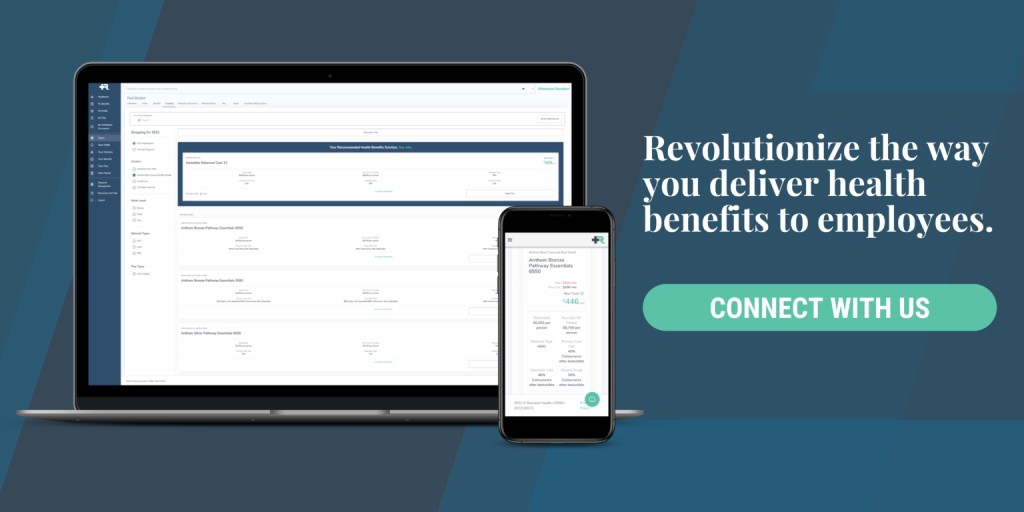
The more you hear about Individual Coverage Health Reimbursement Arrangements (ICHRAs), the more you’re probably wondering what their pros and cons are. Before making any major decision—such as switching health insurance—people often weigh the pros and cons, and rightfully so. Making a “pros and cons” list helps you make decisions more objectively.
It’s important to weigh your options when determining the best health insurance option for your employees or clients. But one thing’s for sure: ICHRA plans are worth considering. ICHRA benefits are ample, and its disadvantages are minimal.
Many people are steering away from traditional group “one-size-fits-all” health insurance, and there’s a reason for that—more than one, in fact. These days, people expect customization and flexibility, and ICHRAs provide those things, which is why more and more people are switching to ICHRAs. However, all health benefits have pros and cons, and ICHRAs are no exception.
Understanding ICHRA: A Quick Overview
Before diving into the pros and cons, it’s essential to understand what an ICHRA is and how it works. ICHRAs are modern alternatives to traditional group health plans. They allow employers to reimburse employees pre-tax for individual health insurance coverage, offering a personalized approach to healthcare benefits.
Introduced in 2020, ICHRAs were designed to provide more flexibility and choice compared to traditional group health plans. They emerged as a response to the need for customization and adaptability in the ever-changing health insurance landscape.
Who can set up an ICHRA? Any employer, regardless of size or industry, can establish one. The basic setup involves defining employee classes, determining reimbursement amounts, and ensuring compliance with federal regulations. It’s a straightforward process that provides businesses with more control over their health benefits strategy.
How ICHRA Works
The mechanics of ICHRA are straightforward yet flexible. Employers begin by deciding how much they want to contribute to employees’ health coverage. These contributions are defined amounts allocated monthly, allowing the employer to control healthcare expenses without the unpredictability of a group health insurance plan.
Employees then use these funds to purchase individual health insurance plans that suit their needs.
What about other benefits? ICHRA can be integrated with existing employee benefits, such as dental and vision plans, ensuring comprehensive coverage while maintaining flexibility. This adaptability makes ICHRA an attractive option for employers seeking alternatives to traditional group health plans.
Below, you’ll find a comprehensive list of ICHRA pros and cons. We hope this list will give you a better idea of whether ICHRAs are the right choice for your employees or clients.
First, Let’s Start With the Pros
1 . Flexibility
ICHRAs allow employers to provide different reimbursement levels based on 11 employee classes. This flexibility enables businesses to tailor their health benefits to meet their workforce’s diverse needs.
2. Cost Control
Unlike traditional group health insurance plans, ICHRAs allow employers to set health benefits budgets. This helps businesses manage their healthcare costs more effectively, as they can adjust the reimbursement rates as needed.
3. Employee Choice
With ICHRAs, employees can shop for plans on the individual marketplace based on their unique needs and preferences. This empowers employees to select the coverage that best suits them, leading to higher satisfaction and retention.
4. Tax Advantages
Employers can claim a tax deduction for the reimbursements made through ICHRAs, providing tax savings for the business. Additionally, employees can use pre-tax dollars to pay for their health insurance premiums, reducing taxable income.
5. Portability
Unlike traditional group health insurance plans, individual health plans through the ICHRA are portable, meaning employees can take their health benefits with them if they change jobs. This can be a significant advantage for employees who value continuity of coverage.
Now, Onto Those Cons
1. Administrative Burden
Implementing and managing an ICHRA can be complex and time-consuming, requiring employers to establish and maintain detailed reimbursement records. This administrative burden can be challenging for small businesses with limited resources. (Luckily, Remodel Health is here to help manage ICHRAs).
2. Coverage Options Limited by Location
While ICHRAs offer employees choice, the availability of coverage options may be limited depending on the individual market in which an employee resides. Employees in areas with fewer insurance providers in their area may have fewer options.
3. Strict Compliance Rules
ICHRAs are subject to strict compliance rules, including offering minimum essential coverage and affordability standards. Failure to comply with these rules could result in penalties for employers.
4. Dependency on Individual Market
ICHRAs’ effectiveness depends on the stability and availability of the individual health insurance market. Changes in the market, such as premium increases or plan cancellations, could impact their viability. The future of ICHRAs is promising, and so is the expected expansion of the individual marketplace.
So, Is ICHRA the Right Choice for You?
ICHRAs offer employers a flexible, cost-effective solution that is the modern approach to traditional group health insurance plans. However, they also come with administrative challenges and potential drawbacks that must be carefully considered. By weighing the pros and cons of ICHRA, businesses can determine whether it is the right choice for providing health benefits to their employees.


